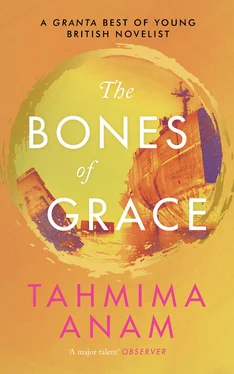I was going to lean back and read the whole thing from the beginning, fully in thrall now to being lost and on my own, when I heard someone coming into the library and saw that it was the sleeping boy. Upright, he was small and wild, his hair cut very close to his scalp, his shorts torn at the cuffs. I was happy to see him. ‘I’ve gotten lost,’ I said to him in Bangla. He smiled with his mouth, his eyes, his forehead — his whole face — and offered to direct me. I followed him through a door on the other side of the room. We travelled down a flight of stairs, peering through a circular window into an enormous kitchen. Then we were in the passenger area again, a wide courtyard open three storeys to the sky.
His name was Mo. He looked like a lot of the street children I had seen in Dhaka selling flowers or little square packets of popcorn on the street. They smiled at you as if they were going home to air conditioning and train sets. Even when they begged it was with a laugh behind their eyes, a secret only they were privy to, the secret being that if they cried, or looked unhappy, or gave away something of their lives, something you couldn’t possibly stomach, you would walk away without parting with a single taka. Mo had the look of one of those kids who was used to making himself so friendly and indispensable that whoever was passing him little scraps of food or money would decide it was less of a hassle to keep him on than to get rid of him. I didn’t know anything about him, but I knew this: his friendliness was a façade, and behind that façade was a decade or so of terrible things I would never know about.
I couldn’t tell if we were lost, or if Mo was taking me on his own personal tour of the ship, and I wasn’t sure why I was following him, but I wanted to be in his company a little longer. He said, ‘Apa, I would like to tell you something.’
‘My name is Zubaida.’
‘Last night, I climbed the ladder and slept here.’
‘In that little room downstairs?’
‘No, a bigger one with sheets.’
‘Was it nice?’ I asked.
‘I didn’t steal anything,’ he said.
Mo stopped in front of a pair of double doors. At first when I pushed against one, I thought it might be locked, but it was just heavy, opening with a swishing sound. Inside, I found an unpunctuated darkness. ‘Torch,’ Mo whispered. I pulled the flashlight out again, and he plucked it from my hand. The carpeted floor tilted downwards, and we followed it, our footsteps silent, until we reached a small wooden stage. I turned and looked behind me and saw row upon row of upholstered chairs. We followed the lip of the stage and climbed up a few steps. A thick pair of curtains bore the name of the company: HEAVENLY CRUISES. We pulled aside the curtain, weighed down with a thick chain. Mo waved the flashlight into the darkness. I saw a wall of ropes and pulleys. I reached out my arms and felt the polished, satin curve of an instrument, the wood warm against my palm. Mo moved the light slowly over it, revealing its legs, trimmed with brass, bolted to the floor, its castors removed. I reached over, pulled back the lid, the white keys shining and alien, and put my hand over Mo’s thin wrist, guiding the beam of light over the keys, where a piece of paper rested, crumpled by the lid. It was sheet music, the notes crowded together and incomprehensible to me. Over the top was written: Shostakovich: Preludes .
Ali heaved an exaggerated sigh of relief when he spotted me. ‘What happened to you, madam? I have been very worried.’
‘I got turned around,’ I said.
Ali noticed Mo and grabbed the back of his neck. ‘How did you come here? Go back to your group.’
‘He helped me find my way out,’ I said.
‘He doesn’t work here,’ Ali said.
‘Oh, come on,’ Gabriela interjected, ‘we all know that’s not true.’
I complimented Ali on the grandness of Grace . ‘She’s exquisite.’ I told the others there was something they should see in the big auditorium below. Ali released the back of Mo’s shirt.
‘You mean the piano,’ Jack said. ‘It’s really something.’
Ali told us that the hotel owner, Mr Reza, would be inspecting the piano along with everything else on board. But he wasn’t hopeful. ‘No market for pianos in Bangladesh. We are not a cultured people in that way.’
‘Not in Western instruments,’ Gabriela said, ‘but you have a rich musical tradition of your own.’ Last night, at Gabriela’s request, I had outlined the highlights of Bengali culture. Tagore. Nazrul. The language movement. I had even told her about Rokeya and her imaginary utopia. We had huddled around my laptop and read Sultana’s Dream together, and she had laughed at this line: ‘The men should not do anything, excuse me; they are fit for nothing.’
I urged everyone to follow me downstairs and take a closer look at the piano. We returned to the auditorium and gathered around the instrument, our lights casting yellow petals onto its mirrored surface. I felt a rush of pride when someone behind me emitted a gasp. I was already attached.
Gabriela volunteered to play. She pulled out the piano stool and placed her hands on the keys. She wasn’t very good — I thought she might play the Shostakovich, but it was beyond her — yet the sound moved powerfully through the room. We felt the notes under our feet. No one seemed to want to hold up their torches any more, so the scene dissipated, Gabriela herself invisible but for her foot on the brass pedal.
She stopped abruptly. ‘It needs tuning, she said into the darkness, ‘but it’s a lovely instrument — something almost human about it.’ We heard the lid snap shut. ‘You shouldn’t sell it to the hotel, Mr Ali.’
‘We had this guy, this piano player, who loved that thing,’ Jack said. ‘Think he was Hungarian. You should’ve seen the tears when we told him the ship was sold.’
We shuffled back through the auditorium. I tried to imagine the old Hungarian man playing the Preludes as Grace cut through the sea on her way here. I asked Jack what had happened to him.
‘Don’t know,’ he said, blinking against the equatorial brightness as he opened the door. ‘Once you get to shore, everyone goes their own way.’
I am not a superstitious person, but the piano and the sheet music were telling me something. A smoke signal. I hadn’t forgotten about you in the year that had passed, Elijah, but I had found a way to push you out of my mind, because there were already too many complicated things, too much to regret. I got used to the dull feeling of longing I carried around with me all the time, telling myself it wasn’t just you, but Diana too, and Rashid, and the baby I now wanted; my whole life, and somehow this made it easier, spreading the grief around. Occasionally I would look down at my phone and be tempted to dial your number, but I never got past the initial urge: I would have no idea where to begin. There was too much to tell, and I was morbidly full of all those unsaid words, but now the piano was giving me an excuse — a compulsion — so I called you and left a message, struggling to keep my voice steady: hello, it’s me, Zubaida. It’s been a long time, I know, but I was hoping we might talk. Please call me back .
While I waited for you to return my call, I allowed myself to become friends with Mo. He ran with a few other boys in a sort of gang around the shipyard, and though he was smaller than most of them, they seemed to regard him as something of their leader. I once saw him herding a group of six or seven boys into the water, and when they were about waist-high he pushed them in, one by one, like he was launching paper boats, and then he made them hold hands and float on their backs, all in a line, and they squealed with happiness and the tickle of salt water in their ears. I wasn’t sure what work Ali had Mo do, but though he was often rough with him, I believed there was some affection between them, and that Mo’s position, if far from comfortable, was at least secure (on this count, as on many others, I was wrong, Elijah. I wonder if you soften towards me because of my honesty, or if it disgusts you to know how blind I was, not just on my own account, but on that of others).
Читать дальше












